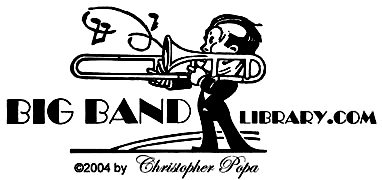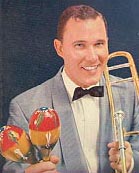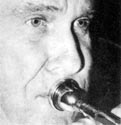
WARREN COVINGTON
"For You, Mr. Covington"
by Christopher Popa

He gets credited most often as director of the Tommy Dorsey Orchestra, which he led from 1958-61, the period when it recorded a top 10 dance favorite, Tea for Two Cha Cha.
But Warren Covington's musical achievements span several decades before and after that, so I was proud to introduce him when he played a one-nighter at the Palace Theater in Canton, Ohio in May 1986.
"I mean, this is my life," he told me, "and I treat every performance as if it was for the worldwide television. 'Cause I love it. I'm very fussy, I like class, I like a classy band, I like a classy act, and I like it diversified."
His career certainly was varied, starting off as a sideman with Isham Jones in 1939, then Mitchell Ayres the following year, and Horace Heidt after that.
I asked Covington when he first got the desire to lead his own big band.
"Well the germ of that had been put into my head by Horace Heidt," he replied. "In '41-'42-'43, I was with Heidt and he wanted to get and own three places. He wanted to get and set me up with a band, Frankie Carle and a band, and him. He did buy the Casino Gardens down in Santa Monica, he wanted to buy the Graystone Manor in Detroit, and he wanted to buy the Glen Island Casino [in New Rochelle, NY], which was owned by the state. And he was gonna have the bands, each one of us, and we would rotate - it was a marvelous idea! And then do the road work and get the benefit of the radio broadcasts. We would broadcast from there."
"But then," according to Covington, "there was an ASCAP-BMI fight and that meant no recordings, so I never recorded with him. And it's too bad for me because everybody had made it before the war - and I did in a way, but I didn't have records like them. But as soon as I came out, I did. So then I had thought of it at that time, but then I had forgotten about it."
He resumed work as a sideman, with Les Brown, starting in November 1945 for five or six months, followed by a brief period with Gene Krupa.
vital stats:
given name: Warren Lewis Covington
birth: Aug. 7, 1921, Philadelphia, PA
death: Aug. 24, 1999
education: Darby High School, Philadelphia
musical instruction: studied trombone in a suburb
of his hometown; composition with Danny
Hurd at New York University; and voice
with Dr. Stetson Humphrey in Hollywood
military service: U.S. Coast Guard, 1943-45,
incl. "Tars and Spars" show
memberships: AFM; ASCAP, 1956
wife: Kathee
wife: Sylvia, m. Dec. 19, 1990
residences: 1939 Valentines Rd., Westbury,
Long Island, NY (late 1950s); 151 Fox
Hollow Rd., Wyckoff, NJ (1960s); 11223
Pocket Brook Dr., Tampa, FL (1990s)


recommended listening:
Tea for Two Cha Cha with The Tommy Dorsey Orchestra,
Decca, 1958
Miss July vocal, with The Tommy Dorsey Orchestra, Decca,
1959
Oh, to Be Loved Again vocal, with The Tommy Dorsey
Orchestra, Decca, 1959
Wrap Your Troubles in Dreams with the Tommy Dorsey
Orchestra, Decca, 1960
What Kind of Fool Am I trombone solo, with orchestra
conducted by Paul Weston, Reader's Digest, 1969
There's a Kind of Hush (All Over the World) vocal, with
Jo Stafford and The Pied Pipers, Reader's Digest, 1969
This Is All I Ask vocal, with orchestra conducted by Paul
Weston, Reader's Digest, 1969
The Party's Over trombone solo, with Jo Stafford, vocal,
Reader's Digest, 1969
I Believe in You vocal, with Jo Stafford and The Pied Pipers,
Reader's Digest, 1969
Quiet Nights of Quiet Stars trombone solo, with Jo Stafford,
vocal, Reader's Digest, 1969
What the World Needs Now Is Love vocal and trombone
solo, with Jo Stafford and The Pied Pipers, Reader's Digest,
1969
recordings as a sideman - select list:
You Won't Be Satisfied (Until You Break My Heart) Doris Day, vocal,
with Les Brown and His Band of Renown, Columbia, 1945
The Frim Fram Sauce Butch Stone, vocal, with Les Brown and His Band of
Renown, Columbia, 1946
Lover's Leap Les Brown and His Band of Renown, Columbia, 1946
How High the Moon with Gene Krupa and His Orchestra, Columbia, 1946
"I just couldn't take that 6-7 nights a week anymore, it just seemed like a blind alley," he commented. "It was just too hard on me. So I gave the estate a year's notice, and then I continued on as Warren Covington and orchestra, which I really have been doing ever since."
A few years after making some very appealing Dorsey-style recordings of recent pop songs for Reader's Digest in 1969, he applied to the U.S. Patent Office for rights to the names "The Pied Pipers" and "The Clambake 7." He used those trademarks to play in tribute to Tommy, including a 22-day tour to the United Kingdom in 1974, featuring Dorsey alumni Sy Oliver, Skeets Herfurt, Johnny Mince, and Pee Wee Erwin; a PBS-TV fundraiser, "Big Band Bash," taped in New York City in 1978; and an appearance at one of President Reagan's inaugural balls in Washington, D.C. in January 1985.
"Each person, you start following somebody and then the 'you' comes out," he said to me. "And you start to do things a little differently because I'm not the same person. I'm not a fingerprint like Tommy," as he put it, "and it wasn't necessary that I emulate the clipness that he went from tone to tone or the sharpness, nobody knew that, it's the melody that they know and I play. But I did learn, and still do, the tone projection. 'Cause when I play, I play to the far wall and the tone comes out. I don't have to play loud, but it projects and I learned that from listening to him, and I still do that."
Yet other times, like on recordings with everyone from crooner Perry Como to the Allman Brothers rock band and movie soundtracks including "The Godfather," Covington was his own man - classy and diversified, exactly the way he liked it.
Still Covington did not yet form his own group.
"My life went into a different direction," he explained to me. "I went into the studios in New York for ten years, and then I got restless and that's when I started to think again, in '56-'57, about getting a band."
He was on the staff at CBS and had a full schedule of recording dates. (He even played in Tommy Dorsey's band on a pair of disc sessions in September 1950.) Yet studio work, while stable and lucrative, can sometimes become a trap for musicians who want a more adventurous musical diet.
With the assistance of the Willard Alexander booking agency, he was signed as leader of The Commanders, a recording group on Decca.
"While I was doing that, Tommy died, and the estate contacted me through Willard, and that's when I decided to make the transition," he remembered.
Covington was selected as front man for a new Tommy Dorsey Orchestra, and hit the road with the band in February 1958.
I wondered how difficult it was for him to assume Tommy's role.
"Now that's a very good question, Chris," he answered. "In my earlier days, I copied him to a 't.' Everything, everything! Tommy was known to play a little sharp, on the upper end of the pitch," he claimed, "which sounds very normal to me, I like it. Doc Severinsen likes it sharp, too, on the pitch, it's brilliant that way."
I then asked who decided to make Tea for Two into a cha-cha.
"That was my idea," he smiled. "I got it from what they call in New York 'club date bands,' and they were doing that. But the cha-cha hadn't quite broken through. So I mentioned it to my producer, who also liked Latin music. I love Latin music. And so we did it, and boy it just took off. Decca didn't even know they had a hit. And it broke in New York, which was unheard of - they always come out here, to break records in. Akron was always one of the big towns, Akron-Canton, to try out records and see how the response is."
Covington led the Dorsey band for 3-1/2 years, through September 1961. However, even before his contract was up, he began hoping for a less hectic pace.

sources:
ASCAP Biographical Dictionary, Fourth Edition (New York
City: R.R. Bowker Co., 1980), p.101.
Feather, Leonard. The Encyclopedia of Jazz (New York City:
Horizon Press, 1960), pp.170-171.
---. The Encyclopedia of Jazz in the Sixties (New York City:
Horizon Press, Inc., 1966), p.101.
---. The Encyclopedia of Jazz in the Seventies (New York
City: Horizon Press Publishers, Ltd., 1976), p.102.
Popa, Christopher. Interview with Warren Covington,
May 15, 1986.

send feedback about Warren Covington: "For You, Mr. Covington" via e-mail
return to Biographical Sketches index
go to Big Band Library homepage
